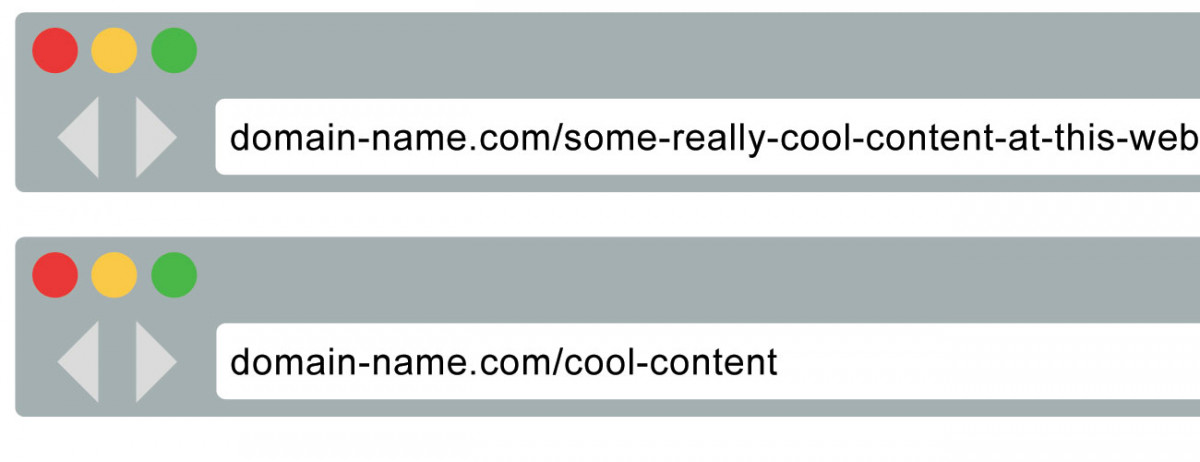The web is full of web pages battling for a spot in the limelight, but it’s tricky to ensure your web pages are seen. However, the good news is, there are plenty of tips and tricks you can try and use to make a good impression on a search engine.
A few weeks ago, we looked at SEO (Search Engine Optimisation) for local businesses, and how they could try and stand out in a crowded audience. Now, we’re going to have a look at URLs. Don’t know what they are? Don’t panic - we’ll introduce you.
What is a URL?
URL stands for Uniform Resource Locator, sometimes known as a URI (Uniform Resource Identifier), or more commonly known as a web address. This is what people type into their address bar to reach a specific page. Each page has it’s own address.
You may not think that a web address would make that much of a difference, but surprisingly, search engines such as Google do like good looking addresses, and there’s a few rules to help.
Size is Important
Despite what some people argue - size is important for a web address. While not strictly an SEO benefit, it’s far easier to remember a short URL than a long one. Same applies for domain names. Which one of these would you remember?
roseblademarketingandwebdevelopmentagency.co.uk, orroseblade.media

Remember that when it comes to individual pages too, this is added to the end of those, so this blog post could be roseblade.media/blog/tips-and-tricks-on-how-to-keep-your-web-addresses-snappy-and-seo-friendly . It just doesn’t have the same ring to it, does it?
Keywords
Many people will tell you that a lot of SEO is about keywords. While there are many (many) factors involved in the calculation of your website’s rank, keywords do still play their part. While you shouldn’t fill up the address bar with keyword after keyword, try and fit one or two into the web address itself.
For example, a URL such as "domain-name.com/welsh-football" would work great for a page based on Welsh Football.
HTTP, or HTTPS?
If you don’t know the difference, HTTP is the way web pages are sent across the Internet. The ‘S’ in HTTPS simply means Secure. This not only secures the data transmitted between the web server (where your website lives) and it’s visitors. Not only can this help boost trust between your visitors and your business, but search engines also give a little bit of a boost to secure sites (for obvious reasons).
Dynamic Pages
You may have visited a webpage and noticed something in the web address along the lines of ?p=some-page&id=18569 . This helps the software behind the site load the correct page. However, there are ways around this with tools such as htaccess rewriting rules. Confused? Don’t be. Many Content Management Systems (such as WordPress, SilverStripe, Drupal, Joomla and others) all come with easy to use tools to do this for you.
Some search engines do try to make heads or tails of these funky web addresses, but it can be confusing. After all, the ‘p’ in our example could mean absolutely anything.
Friendly web addresses can not only help a search engine understand a page’s content, but it can also help users understand it too. Remember, websites are really designed to be read by humans rather than machines.
Subfolder, or subdomain?
Search engines such as Google enjoy authority and trust. If you have a domain name that’s been around for a long time (or plans to be), it can be considered more trustworthy than one registered for only a year. But they also see subdomains as different domain names, so your blog at "blog.domain-name.com" would be considered a different website, at least in terms of ranking, compared to "domain-name.com/blog" where it will be seen as part of the same site.
Consider your folder structure before making hard and fast decisions. It may be necessary in some cases to separate them (for example, if you’re hosting your blog elsewhere), but subdomains can be considered as separate sites.
Overview
There’s a lot to think about - from folder names and structures, to length and keywords. But what is important, is you consider these things when picking your software and/or developer.
We believe in not only making things easy for our clients, but also try to use the best tools available within budget to maximise their benefits. We only use Content Management Systems and frameworks with search engine friendly web addresses - it’s just another standard feature that we ensure is part of your site.
If you’re looking for a new website, or looking for a bit of guidance on your domain names, don’t hesitate to contact us and see how we could help.





